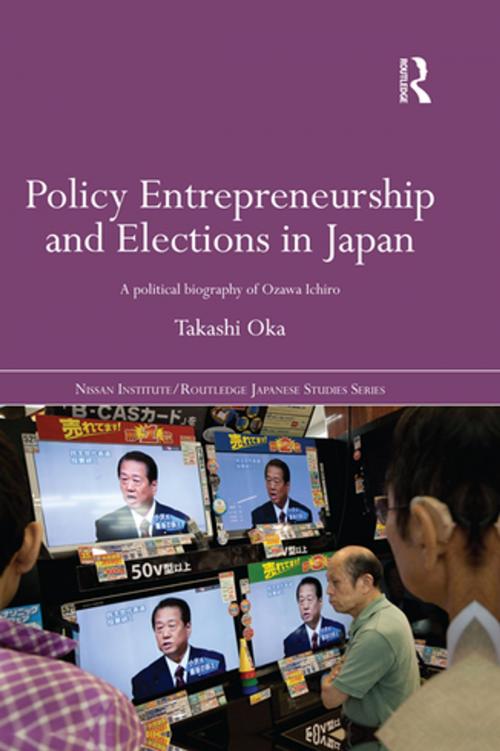Policy Entrepreneurship and Elections in Japan
A Political Biogaphy of Ozawa Ichirō
Biography & Memoir, Political, Nonfiction, Social & Cultural Studies, Political Science, Government| Author: | Takashi Oka | ISBN: | 9781136728631 |
| Publisher: | Taylor and Francis | Publication: | April 22, 2011 |
| Imprint: | Routledge | Language: | English |
| Author: | Takashi Oka |
| ISBN: | 9781136728631 |
| Publisher: | Taylor and Francis |
| Publication: | April 22, 2011 |
| Imprint: | Routledge |
| Language: | English |
Ozawa Ichirō is one of the most important figures in Japanese politics, having held the positions of Chief Secretary of the Liberal Democrat Party and, after defection from the LDP, President of the Democratic Party of Japan. Ozawa has distinctive ideas that set him apart from the average Japanese politician, he believes in the concept of the independence of the individual, as opposed to the importance of the group, and as a policy entrepreneur he has had a huge impact on political change not only advocating but precipitating institutional change in a key political area – the election system.
Using extensive interview data from key players in the political arena, this book examines Ozawa's struggle to normalize alternation in office between two competing
political parties – particularly significant given the results of the 2009 election which handed over power to the Democratic Party of Japan – and how he has used his entrepreneurial talents to precipitate and carry out institutional change.
Not only a political biography, but also an in-depth analysis of the Japanese political and electoral systems, this book will be of huge interest to anyone interested in Japanese politics and electoral systems.
Ozawa Ichirō is one of the most important figures in Japanese politics, having held the positions of Chief Secretary of the Liberal Democrat Party and, after defection from the LDP, President of the Democratic Party of Japan. Ozawa has distinctive ideas that set him apart from the average Japanese politician, he believes in the concept of the independence of the individual, as opposed to the importance of the group, and as a policy entrepreneur he has had a huge impact on political change not only advocating but precipitating institutional change in a key political area – the election system.
Using extensive interview data from key players in the political arena, this book examines Ozawa's struggle to normalize alternation in office between two competing
political parties – particularly significant given the results of the 2009 election which handed over power to the Democratic Party of Japan – and how he has used his entrepreneurial talents to precipitate and carry out institutional change.
Not only a political biography, but also an in-depth analysis of the Japanese political and electoral systems, this book will be of huge interest to anyone interested in Japanese politics and electoral systems.















